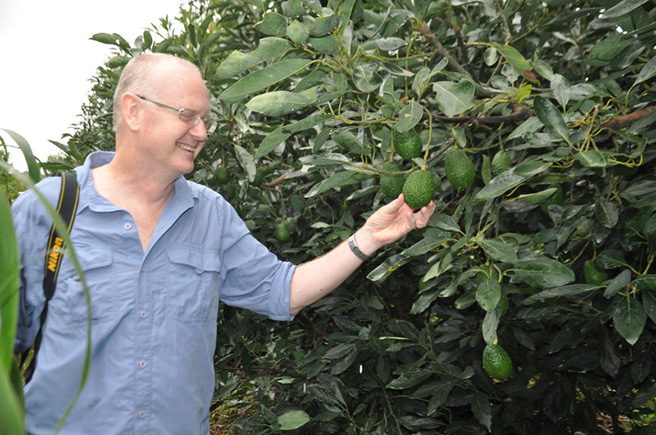Spotlight: Dave Loubser AWF's Program Director for Climate Change

‘Climate Change Needs to be Included in Everything We Do’
Ask Zambian-born Dave Loubser about climate change, and he’ll have a lot to tell you. And well he should: As AWF’s new program director for climate change, Loubser is a trained ecologist who has more than 12 years of experience working on climate change issues, in South Africa, New Zealand, Abu Dhabi, and elsewhere. Here is just some of what he had to say about climate change in Africa.
Q: Why is it so critical to tackle climate change in Africa?
A: Only one African country, South Africa, is on the list of the top carbon emitters worldwide. Yet the impacts of climate change are being felt across Africa, probably more than any other continent. The landscape is changing: The glaciers of Mts. Kilimanjaro and Kenya are melting, and the shorelines of Lakes Chad, Tanganyika, and Victoria are receding.
Climate changes have also led to unreliable farming seasons, low water supplies, increased droughts, and heavy storms. These are serious problems for a continent almost entirely dependent on rain for its food security.
Q: Are there any climate change myths?
A: Climate change is often referred to as “global warming.” The global surface temperature is warming at an alarming rate, but locally, people are seeing something very different. For instance, this year, Europe saw the coldest winter in decades, while Australia had some of its worst floods this century. It is difficult explaining this to a layperson who’s expecting things to be hotter and dryer. But climate change is real, it is happening, and it will impact nearly a billion Africans before 2050—so we had better do something about it now.
Q: Do communities understand the value of climate change programs?
A: As far as mitigation is concerned, no, I don’t think so. You are dealing with some very nebulous concepts, such as payments for this thing called carbon. The fact that if a community uses a clean cookstove, it is going to contribute to stopping the world heating up! So no I think the concept is quite abstract to many people
Adaptation, on the other hand, is more direct. Communities understand that adaptation interventions help with the “here and now” climatic events, such as storms and droughts. Something I am particularly passionate about is documenting the adaptation knowledge of the continent’s current aging populations. In many cases, this is the last generation that still has this indigenous knowledge. This knowledge will help ensure that our adaptation measures are environmentally and socially sound.
Q: What are your some of your near-term goals?
A: My initial goal is to set up a strategy on how we will implement our climate change portfolio. It is vitally important that we, as an organization, share a common vision and direction on how we tackle climate change in Africa.
I also want to start identifying significant projects to undertake. AWF has over the years done a number of climate change–related projects, and done them well. On the whole, however, these projects have been small. If we are to make a substantial impact on this issue, we need to scale up our work. Climate change is such a cross-cutting matter that it needs to be included in everything we do.
Q: What are the climate change projects AWF does have underway?
A: Currently we have three Reducing Emissions from Deforestation and Forest Degradation (REDD+) projects at different stages of development: In Kolo Hills in Tanzania, we are in the process of finalizing verification preparation. The Chyulu Hills National Park project in Kenya is being scaled up to include surrounding community ranches, and a feasibility study is now being undertaken. In the Congo Heartland, we have a project at the pre-feasibility stage for REDD, but is quite advanced on alternative livelihoods and biodiversity aspects. We are also undertaking a landscape-scale climate vulnerability assessment of the Kilimanjaro Heartland, which will inform the development of climate change tools for use in all existing and new Heartlands.
Q: When we talk about climate change, there is often mention of REDD+. Can you tell us more about it?
A: The first point I must make is that climate change is not about REDD+ programs. REDD+ is a tool to be used in certain circumstances as a climate change intervention, but it is just one of the tools in our climate change toolbox.
Also, we need to change the perception that REDD+ is a “cash cow” for communities. What is key about successful REDD+ programs is the combined benefits from all the associated improved ecosystem services, not just from the sequestration of carbon—because in many places in Africa, the carbon sequestration potential is relatively limited. If with a REDD program we can also improve the community’s water supply and quality, reduce smoke from open fires, protect against floods, and protect the biodiversity, then it becomes an effective mechanism.
Q: Anything else that’s important to mention?
A: We work at a landscape scale, which is great for climate change work: The larger the scale you work at, the better the impacts of what you are doing. Climate change is impacting areas beyond our Heartland borders that nevertheless have direct impacts on our Heartlands, and we need to—and in some cases already are—look at these areas. Kenya’s “water towers,” for example, provide major ecosystem services to the Heartlands, yet in many cases, we have little or no influence on them.
Finally, while the climate change situation is serious, it is not too late to at least halt the changes that are happening. We as an organization need to work with governments and other NGOs to ensure that globally there is a more equitable distribution of resources to combat climate change.
